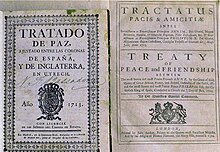| Millennium: | 2nd millennium |
|---|---|
| Centuries: | |
| Decades: | |
| Years: |

| 1713 by topic |
|---|
| Arts and science |
| Countries |
| Lists of leaders |
| Birth and death categories |
| Establishments and disestablishments categories |
| Works category |
| Gregorian calendar | 1713 MDCCXIII |
| Ab urbe condita | 2466 |
| Armenian calendar | 1162 ԹՎ ՌՃԿԲ |
| Assyrian calendar | 6463 |
| Balinese saka calendar | 1634–1635 |
| Bengali calendar | 1120 |
| Berber calendar | 2663 |
| British Regnal year | 11 Ann. 1 – 12 Ann. 1 |
| Buddhist calendar | 2257 |
| Burmese calendar | 1075 |
| Byzantine calendar | 7221–7222 |
| Chinese calendar | 壬辰年 (Water Dragon) 4410 or 4203 — to — 癸巳年 (Water Snake) 4411 or 4204 |
| Coptic calendar | 1429–1430 |
| Discordian calendar | 2879 |
| Ethiopian calendar | 1705–1706 |
| Hebrew calendar | 5473–5474 |
| Hindu calendars | |
| - Vikram Samvat | 1769–1770 |
| - Shaka Samvat | 1634–1635 |
| - Kali Yuga | 4813–4814 |
| Holocene calendar | 11713 |
| Igbo calendar | 713–714 |
| Iranian calendar | 1091–1092 |
| Islamic calendar | 1124–1125 |
| Japanese calendar | Shōtoku 3 (正徳3年) |
| Javanese calendar | 1636–1637 |
| Julian calendar | Gregorian minus 11 days |
| Korean calendar | 4046 |
| Minguo calendar | 199 before ROC 民前199年 |
| Nanakshahi calendar | 245 |
| Thai solar calendar | 2255–2256 |
| Tibetan calendar | 阳水龙年 (male Water-Dragon) 1839 or 1458 or 686 — to — 阴水蛇年 (female Water-Snake) 1840 or 1459 or 687 |
Wikimedia Commons has media related to 1713.

1713 (MDCCXIII) was a common year starting on Sunday of the Gregorian calendar and a common year starting on Thursday of the Julian calendar, the 1713th year of the Common Era (CE) and Anno Domini (AD) designations, the 713th year of the 2nd millennium, the 13th year of the 18th century, and the 4th year of the 1710s decade. As of the start of 1713, the Gregorian calendar was 11 days ahead of the Julian calendar, which remained in localized use until 1923.